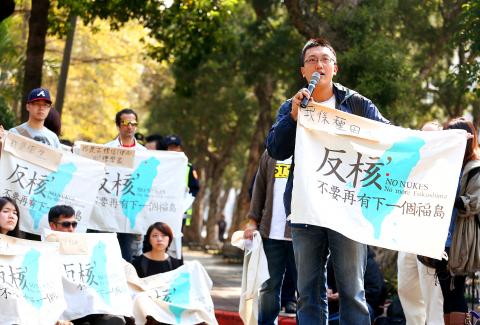About 50 people holding flags reading “No nukes, No more Fukushima” stood at the gate of the Executive Yuan in an anti-nuclear demonstration yesterday, calling on Premier Jiang Yi-huah (江宜樺) to reject a proposal to pass an additional budget for the construction of the Fourth Nuclear Power Plant.
The safety of the yet-to-be-completed plant in New Taipei City’s (新北市) Gongliao District (貢寮) has become the topic of heated controversy.
With handwritten messages such as “I am a student,” “I am a social worker,” “I work on a farm,” “I sing rap,” or “I am a mother” written on their flags, the protestors, who hailed from all walks of life, together shouted “reject the additional budget [proposal] for the Fourth Nuclear Power Plant, stop the dangerous plant.”

Photo: CNA
The demonstration’s convenor, Green Citizens’ Action Alliance deputy secretary-general Hung Shen-han (洪申翰), said the budget for the construction of the plant has gradually increased from NT$169.7 billion (US$5 billion) to NT$280 billion, and there are also plans to request further funds in the first half of this year.
While previous decisions were said to have been made by specialists, now billions of dollars were being spent constructing a plant that has many safety problems, Hung said, encouraging people to learn about nuclear power and not leave all the decisions to specialists.
The alliance said that the Executive Yuan has the authority to deny or approve any proposed additional funds and it urged the new Cabinet to reject the budget proposal for the plant.
Lee Chien-chen (李建誠), a member of the 248 Market, a weekend farmers’ market, said consumers do not dare purchase any agricultural products produced near Fukushima following the nuclear disaster.
If the Fourth Nuclear Power Plant goes into commercial operation and an accident occurs, agricultural products from nearby would also be affected, Lee said.
The demonstrators also presented a photo album consisting of pictures of people holding the anti-nuclear flags at various locations. The demonstrators hoped the photos would serve to remind the Cabinet of Taiwan’s natural beauty and how it could be endangered by nuclear power.
They also vowed they would never give up and would do all they could to stop the approval of the additional funds and the insertion of the reactors’ fuel rods.
Meanwhile, at a separate setting, Democratic Progressive Party (DPP) Chairman Su Tseng-chang (蘇貞昌) said President Ma Ying-jeou (馬英九) should immediately announce the suspension of the construction of the Fourth Nuclear Power Plant without holding a referendum on this issue.
Although an anti-nuclear referendum proposal was initiated by former vice president Annette Lu (呂秀蓮) and numerous environmental groups, Su told the legislature that if Ma was determined, he should stop the construction by himself.
“Actually, it is not necessary to hold a referendum,” he said.
Su said the DPP has insisted on making Taiwan nuclear-free in 30 years.
After the accident at Japan’s Fukushima Dai-ichi nuclear power plant, he said, the whole world was promoting non-nuclear initatives. The party asked Ma to immediately suspend the construction of the plant, refuse to earmark further funds and halt the loading of the fuel rods at the yet-to-be-completed plant.
The chairman added that the DPP is determined to enact a law that stipulates that Taiwan is a non-nuclear country.

The first global hotel Keys Selection by the Michelin Guide includes four hotels in Taiwan, Michelin announced yesterday. All four received the “Michelin One Key,” indicating guests are to experience a “very special stay” at any of the locations as the establishments are “a true gem with personality. Service always goes the extra mile, and the hotel provides much more than others in its price range.” Of the four hotels, three are located in Taipei and one in Taichung. In Taipei, the One Key accolades were awarded to the Capella Taipei, Kimpton Da An Taipei and Mandarin Oriental Taipei. Capella Taipei was described by

The Taichung District Court yesterday confirmed its final ruling that the marriage between teenage heir Lai (賴) and a man surnamed Hsia (夏) was legally invalid, preventing Hsia from inheriting Lai’s NT$500 million (US$16.37 million) estate. The court confirmed that Hsia chose not to appeal the civil judgement after the court handed down its ruling in June, making the decision final. In the June ruling, the court said that Lai, 18, and Hsia, 26, showed “no mutual admiration before the marriage” and that their interactions were “distant and unfamiliar.” The judge concluded that the couple lacked the “true intention of

EVA Airways today confirmed the death of a flight attendant on Saturday upon their return to Taiwan and said an internal investigation has been launched, as criticism mounted over a social media post accusing the airline of failing to offer sufficient employee protections. According to the post, the flight attendant complained of feeling sick on board a flight, but was unable to take sick leave or access medical care. The crew member allegedly did not receive assistance from the chief purser, who failed to heed their requests for medical attention or call an ambulance once the flight landed, the post said. As sick

INDUSTRY: Beijing’s latest export measures go beyond targeting the US and would likely affect any country that uses Chinese rare earths or related tech, an academic said Taiwanese industries could face significant disruption from China’s newly tightened export controls on rare earth elements, as much of Taiwan’s supply indirectly depends on Chinese materials processed in Japan, a local expert said yesterday. Kristy Hsu (徐遵慈), director of the Taiwan ASEAN Studies Center at the Chung-Hua Institution for Economic Research, said that China’s latest export measures go far beyond targeting the US and would likely affect any country that uses Chinese rare earths or related technologies. With Japan and Southeast Asian countries among those expected to be hit, Taiwan could feel the impact through its reliance on Japanese-made semi-finished products and